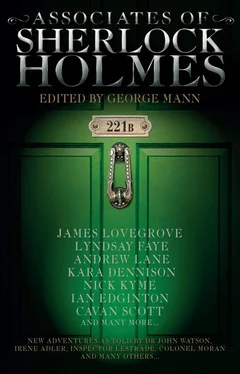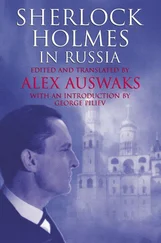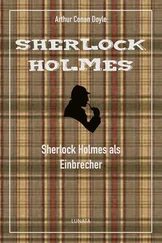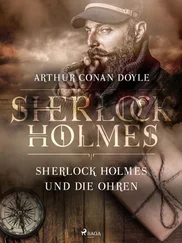Holmes submitted that Amberley must have hidden the cash and documents elsewhere in the house, in a safe place, as part of his scheme to frame the adulterous couple as thieves and throw the police off the scent. Accordingly, constables searched the Haven the following day and found a bureau with a secret drawer capacious enough to hold all those papers and sheaves of pound notes. The drawer, however, proved to be empty, and although they continued to comb the house from attic to cellar, they discovered no other suitable potential location.
Amberley himself refused to divulge where he had concealed the items. Throughout his trial, all the way to his appointment with the scaffold, he kept the secret. I think that, even to the bitter end, he felt there was a remote chance he would escape justice. He anticipated that he might somehow receive a custodial sentence instead of a capital one, on grounds of diminished responsibility perhaps, the balance of his mind disturbed by jealousy, that sort of thing. He might even – for all that it was an almost impossibly unlikely outcome – be exonerated.
He was not. Amberley went to his grave knowing that the bulk of his competence was not where he had stowed it but believing that it was still recoverable should he ever be set free. The cash might be forfeit but the bonds would be impossible to sell through any legitimate outlet and would fetch a tiny fraction of their worth on the black market. Even if they were disposed of somehow, it would not be beyond the bounds of feasibility to track them down and through them trace a path back to the original seller, the thief.
This, I am sure, was his logic. In his imagined future, where he was released at some stage to resume life as a free citizen, Josiah Amberley would hunt down the individual who had raided the bureau and its secret drawer and exact a terrible vengeance upon him.
* * *
That I am sitting here writing down these words is proof, if proof were needed, that Amberley did not get to fulfil his desire. He was hanged that autumn, after a trial in which the jury took no more than ten minutes to return a guilty verdict. He never knew who it was that had made off with his fortune.
The securities that I extricated from the bureau, I burned. I could not take the chance of them being found in my possession, and trying to sell them posed an even greater risk.
As for the few thousand pounds, I eked it out and made the most of it. I spent it carefully and judiciously, little by little, a bit here, a bit there, using it to prop up my finances during lean times when business was not good. I was not rash with it. I did not make any extravagant or ostentatious purchases, lest this alert someone – specifically Sherlock Holmes – that I was living beyond my means. It was Holmes whom I feared, above all else. He, more than anyone, might deduce where the loot had gone. He might work out that I had broken into the Haven the night after Amberley was arrested. He might realise that I had, as a change from solving crimes, elected to commit one.
Because Holmes never troubled himself to enquire further into the matter, I can only assume that the mystery of the missing lucre was too petty for him. Maybe he felt it was beneath his dignity to follow up on a case he had so triumphantly cracked. The money was a minor loose end. Why not leave it to the police to tie up? He, the mighty Sherlock Holmes, had bigger fish to fry. It is highly likely that the subject slipped his mind altogether, for soon after the Amberley case another problem engaged his attention, the vexing affair of Lady Eva Blackwell and “the worst man in London”, the blackmailer Charles Augustus Milverton.
I do wonder, though, whether he actually knew all along that I had taken the money. By all accounts he lives in Sussex now, near Eastbourne. He is in his dotage, keeping bees. Does he ever think of me, down there in his retirement cottage by the sea? Does he smile fondly, perchance, as he recalls his former Irregular and one-time collaborator Clarence Barker?
Does he ruminate on how he let me get away with an audacious act of thievery?
If so, why did he not pursue me at the time? Why did he not apprehend me, as he did so many other wrongdoers?
I like to think that he felt I had earned the money. I deserved it. It was due to me not because I joined forces with him and went unpaid for my efforts, but rather because he was ashamed by the way he spurned me when I approached him with my offer of a partnership. He felt guilty that he did not take me on as a protégé and help me make the most of my talents. Deliberately allowing me to slip through the net was his penance.
Perhaps. Perhaps.
At least he never knew that I had urged Dr Ernest on in his romantic pursuit of Mrs Amberley and his bid to steal from her husband. He never learned about that.
In that one regard, I am unequivocally Sherlock Holmes’s better. I got away with something that virtually no one else has: pulling the wool over the great detective’s eyes. I outwitted him. He failed to see through me, as he did so many others, Josiah Amberley among them.
There is this sentence in one of the final paragraphs of “The Adventure of the Retired Colourman”:
“Pure swank!” Holmes answered. “He felt so clever and sure of himself that he imagined no one could touch him.”
The subject is Amberley, of course, and it is as apt a description of that fiend as any.
But it could just as easily be me.
Signed, Clarence Barker January 1926
HEAVY GAME OF THE PACIFIC NORTHWEST
Tim Pratt
When I was approached to write a story for this project, I immediately wanted to write about Sebastian Moran, but was sure some other writer would have snatched him up. Imagine my delight to find he was still available. Moran first appeared in “The Adventure of the Empty House” (1903), and was arrested in the same story, but Doyle implied a lot of backstory, with Moran named as Moriarty’s lieutenant, “the second most dangerous man in London.”
I confess, though, that Moran made a bigger impression on me with his roles in the works of other authors. He appeared as vile blackmailer “Tiger Jack” Moran in George MacDonald Fraser’s Flashman series; as hired killer and adrenaline junkie “Basher” Moran – the narrator of Kim Newman’s marvellous Professor Moriarty: The Hound of the D’Urbervilles , where Moran plays a dark Watson to Moriarty’s “consulting criminal”; in a minor but memorable role in Anthony Horowitz’s novel Moriarty ; and even as the profoundly damaged narrator of Neil Gaiman’s Lovecraftian Holmes story A Study in Emerald . In all those stories, Moran is a formidable man of great courage, who happens to possess no moral compass at all – a fascinating figure, psychologically. The fact that he is canonically the author of at least two autobiographical volumes about his time as a hunter made it obvious that my story should be a memoir of a hunting trip, too.
—Tim Pratt
Memoirs are a poor substitute for sport, but with little else to occupy my time in this dreary cell, I may as well take up my pen again. My earlier literary efforts, Heavy Game of the Western Himalayas and Three Months in the Jungle , were well received by their intended audience, but I daresay the recent notoriety inflicted upon me will lead to a wider interest in whatever I write now. I’m sure many would be eager to read about my career with the late professor, but that work never interested me much beyond the technical challenges and the generous remunerations. I’m minded instead to begin these reminiscences with the last time I took up rifle against heavy game in the forest… and the extraordinary, and, to some degree, inexplicable manner of my survival in those circumstances.
Читать дальше












